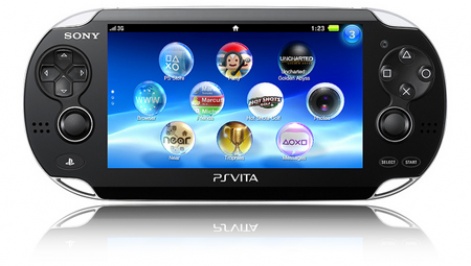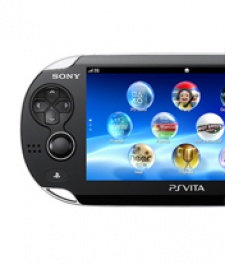In others, the handheld feels more deeply embedded in PlayStation ideals than anything since its pinnacle with PlayStation 2 over a decade ago.
This apparent contradiction or, perhaps, internal conflict is a better way of describing it is incredibly important.
It demonstrates the level at which Sony has been able to tap into PlayStation's strengths, while at the same time reacting to the competition; a balance that is going to play a huge role in defining the device's longterm success or failure.
False fight
It's now coming up for a week since I've been using PS Vita and my gut tells me Sony has got something very right.
That's largely because it finally appears to be aware of who the competition is.
It's easy to forget now, but PSP was widely heralded as a guaranteed success by the press when it was first announced.
Nokia's N-Gage was had arrived stillborn, Nintendo had been trounced in the home console market and, given PSP was widely pitched as a portable PS2, few could see any rival handheld matching up.
Yet, Nintendo with the DS shifted consumer perception of what could be expected of a portable device, and PSP - more focused on hi-specs and graphical grunt seemed out of touch with the mainstream appeal Nintendo was able to court.
As if that wasn't enough, PSP's latter years saw it undermined yet again, this time by smartphones that arguably targeted the same kind of smart and savvy consumer as PlayStation, but were able to do so with software that cost a fraction of the price.
PSP, as it turned out, was tooled up for a war none of its competitors wanted to, or indeed did, fight. Sony had assumed the market would play by its own rules Nintendo, and Apple, disagreed.
The right war
The easy mistake Sony could have made with PS Vita given the stellar sales DS has amassed in its lifetime would have been to focus its attention on Nintendo's new vehicle, 3DS.
Instead, five minutes with Sony's new hardware demonstrates the firm is more than aware of where the real threat lies.
Starting up the device's download PlayStation Store is incredibly revealing: on board from day one are hundreds of PSP titles and PSP minis, the vast majority with sub-£10 (or, in Minis' case, sub-£5) price points specifically designed to reach out to smartphone owners.
It's the kind of packed digital marketplace that anyone looking to rival iOS has to secure for launch. You need apps and games and a lot of them.
Vital to this is a small section of the store labelled Social. Though there are just four apps on board Facebook, Foursquare, Flickr and Twitter (all free of course) the fact Sony recognises the kind of services gamers now look for in portable devices says a lot.
Indeed, while the OS that PS Vita uses is less than perfect bizarre loading screens, the habit the handheld has on re-logging into PSN with the start of every new title, and the decision to split Vita's social tools into separate apps rather than pulling them together in one neat tool the most frustrating element is the lack of an email client.
Vita is screaming out for an email client, and not just because the device's virtual keyboard is surprisingly adept, but because, at almost every stage, PS Vita feels far more closely related to smartphones and tablets than it does either PSP or 3DS.
Talking the talk
That's what makes it such a surprising piece of hardware from Sony. PSP's late-but-not-great Step Your Game Up ad campaign in the US saw the firm poke fun at what it pitched as childlike smartphone games over a series of promos.
It was a particularly unwise move, not only because it made PSP look entirely out of step with the very consumers it was trying to entice, but also because it painted Sony as a stubborn and ultimately unfashionable old power just as the then seemingly untouchable Nintendo and Sega had looked back in the mid-90s, when the original PlayStation brought a breath of fresh air to the industry.
PS Vita draws a line under that attitude.
The relative costs involved in making games mean it's never going to attract support from indie developers in the way smartphone platforms do, but it is at least speaking the language of the digital age: developers and publishers can now reach customers in the same way they do on mobile, pricing their games if they so choose just as competitively.
And that's where Sony will need the support of both the big publishers, and its own internal teams if its vision is to be realised.
The price is wrong
Still, while native PS Vita releases like Escape Plan at £9.99, Hustle Kings at £6.49 and MotorStorm RC at £4.79 suggest Sony is adhering to its new 'perception-based pricing' strategy, the likes of Uncharted: Golden Abyss at £39.99 and EA's FIFA Football at £44.99 stick out like a sore thumb.
Game pricing and monetisation is an issue that's impacting across the entire industry, but what's certain is, slapping a £35+ price tag on a game is a tactic that's going to work with fewer and fewer franchises moving forward.
And in all other areas, PS Vita ticks more boxes than it doesn't.
Sony's willingness to rip up its own rulebook and embrace the new harks right back to the strategy that helped PlayStation blow away the competition almost 20 years ago.
The company has found the sweet spot for its new PlayStation device, but aside from the quality of the PS Vita hardware, it's going to need to build and gain longterm support from developers big and small if its comeback isn't to become a false dawn.






















